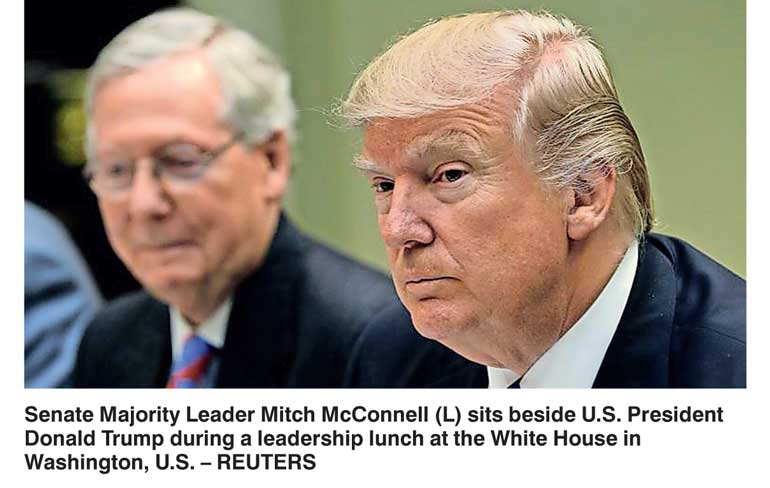Sunday Feb 22, 2026
Sunday Feb 22, 2026
Friday, 3 March 2017 00:00 - - {{hitsCtrl.values.hits}}
 Reuters: U.S. President Donald Trump’s administration said on Wednesday that it will take aggressive action to combat other countries’ unfair trade practices and may defy World Trade Organization rulings that it views as interfering with U.S. sovereignty
Reuters: U.S. President Donald Trump’s administration said on Wednesday that it will take aggressive action to combat other countries’ unfair trade practices and may defy World Trade Organization rulings that it views as interfering with U.S. sovereignty
In an annual trade policy agenda document, the U.S. Trade Representative’s office said the administration “will not tolerate” unfair trade practices that distort markets, including currency manipulation, unfair government subsidies, intellectual property theft and state-owned enterprises.
The document publicly released to Congress on Wednesday signals that the administration may try to push the limits of what is acceptable under WTO rules in its quest to make good on campaign promises to slash U.S. trade deficits with China and Mexico, and bring manufacturing jobs back to the United States.
The document represents a departure from the Obama administration’s strict adherence to WTO compliance in its challenges to unfair foreign trade practices.
“Unlike earlier presidents, Trump is signalling a willingness to impose import restrictions – especially against a country like China – where the justification under WTO rules for doing so may be highly questionable,” said Chad Bown, a senior fellow and trade expert at the Peterson Institute for International Economics in Washington.
“The downside of the United States going down this path is that it is likely that other countries will follow suit immediately,” Bown added.
The USTR document said it was not in the United States’ interest to let some WTO rulings undermine the use of effective remedies that the Geneva-based trade body expressly allows to fight unfair trade.
“Accordingly, the Trump administration will act aggressively as needed to discourage this type of behaviour – and encourage true market competition,” the USTR said in the document.
Laying out many of Trump’s trade plans in writing for the first time, the document said the Trump administration plans to strictly enforce U.S. trade laws, defend U.S. national sovereignty over trade policy, and use all possible leverage to open foreign markets to U.S. exports, the document said.
It makes clear the Trump administration’s view that U.S. law supersedes WTO rules – a view that could be invoked should Congress adopt a border tax adjustment plan to impose new taxes on imports that is later challenged as violating WTO tariff rules by other member countries.
“The Trump administration will aggressively defend American sovereignty over matters of trade policy,” the report said.
The nominee to be Trump’s top trade negotiator, veteran steel industry lawyer Robert Lighthizer, in 2010 advocated “aggressive interpretations of WTO provisions that might help us deal with Chinese mercantilism.”
Lighthizer is awaiting confirmation by the U.S. Senate. He served as a deputy USTR in the Reagan administration, helping to negotiate import quotas on Japanese goods in the 1980s, with the help of powerful trade law provisions that have largely gone unused since the WTO was launched in 1995.
Reuters: China supports the work of the World Trade Organization (WTO), the country’s foreign ministry said on Thursday, after U.S. President Donald Trump’s administration said it might defy WTO rulings it viewed as interfering with U.S. sovereignty.
Maintaining a fair and open multilateral system with the WTO at its centre benefits global economic growth and is in the interests of everyone, foreign ministry spokesman Geng Shuang said.
“Since China joined the WTO it has always proactively supported the WTO’s work, and this position will not change,” he told a daily news briefing, when asked about the U.S. proposal.
China’s Commerce Ministry declined immediate comment.
In an annual trade policy agenda document released to Congress on Wednesday, the U.S. Trade Representative’s office said the administration “will not tolerate” unfair trade practices that distort markets.
These range from currency manipulation and unfair government subsidies to intellectual property theft, it added.
The document signals that the administration may try to push the limits of what is acceptable under WTO rules in its quest to make good on campaign promises to slash U.S. trade deficits with China and Mexico, and bring home manufacturing jobs.
It marks a departure from the Obama administration’s strict adherence to WTO compliance in its challenges to unfair foreign trade practices.
China, worried that its export-dependent industries will suffer, has repeatedly urged global leaders to reject protectionism, which Trump has championed with his “America First” campaign.